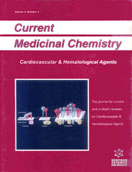Abstract
Coronary stents are currently used in most percutaneous coronary interventions, since they have demonstrated to reduce restenosis and allow to solve threatened closure after balloon angioplasty. Despite these beneficial effects, restenosis remains as the main limitation of percutane ous coronary interventions even with the use of coronary stents. In the last 3 years, some coronary stents eluting anti-proliferative drugs have demonstrated to dramatically reduce the risk of restenosis. By November 2004, two different types of antiproliferative drugs eluted by coronary stents are commercially available: sirolimus (rapamycin) and paclitaxel. The mechanisms, clinical evidence, as well as the remaining limitations of these drug-eluting stents are reviewed. The current knowledge of other anti-proliferative drugs that are currently under investigation is also reviewed.
Keywords: coronary stent, anti-proliferative drug, sirolimus, paclitaxel, restenosis
 3
3













